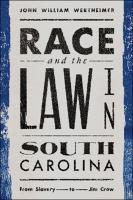Race and the Law in South Carolina
From Slavery to Jim Crow
Author(s)
Wertheimer, John William
Language
EnglishAbstract
Race and the Law in South Carolina carefully reconstructs the social history behind six legal disputes heard in the South Carolina courts between the 1840s and the 1940s. The book uses these case studies to probe the complex relationship between race and the law in the American South during a century that included slavery, Reconstruction, and Jim Crow.
Throughout most of the period covered in the book, the South Carolina legal system obsessively drew racial lines, always to the detriment of nonwhite people. Occasionally, however, the legal system also provided a public forum—perhaps the region’s best—within which racism could openly be challenged. The book emphasizes how dramatically the degree of legal oppressiveness experienced by Black South Carolinians varied during the century under study, based largely on the degree of Black access to political and legal power. During the era of slavery, both enslaved and nominally “free” Black South Carolinians suffered extreme legal disenfranchisement. They had no political voice and precious little access to legal redress. They could not vote, serve in public office, sit on juries, or testify in court against whites. There were no Black lawyers. Black South Carolinians had essentially no claims-making ability, resulting, unsurprisingly, in a deeply oppressive, thoroughly racialized system.
Most of these antebellum legal disenfranchisements were overturned during the post-Civil War era of Reconstruction. In the wake of abolition, Reconstruction-era reformers in South Carolina erased one racial distinction after another from state law. For a time, Black men voted and Black jurors sat in rough proportion to their share of the state’s population. The state’s first Black lawyers and officeholders appeared. Among them was an attorney from Pennsylvania named Jonathan Jasper Wright, who ascended to the South Carolina Supreme Court in 1870, becoming the nation’s first Black appellate justice.
By the turn of the twentieth century, however, an explicitly white supremacist movement had rolled back many of the egalitarian gains of the Reconstruction era and reimposed a legalized racial hierarchy in South Carolina. The book explores three prominent features of the resulting Jim Crow system (segregated schools, racially skewed juries, and lynching) and documents the commitment of both elite and non-elite whites to using legal and quasi-legal tools to establish hierarchical racial distinctions. It also shows how Black lawyers and others used the law to combat some of Jim Crow’s worst excesses. In this sense the book demonstrates the persistence of many Reconstruction-era reforms, including emancipation, Black education, the legal language of equal protection, Black lawyers, and Black access to the courts.
Keywords
History;History of the Americas;Legal historyDOI
10.3998/mpub.12531540ISBN
9781943208326, 9781943208333Publisher
Amherst College PressPublisher website
https://acpress.amherst.edu/Publication date and place
2023Classification
History
History of the Americas
Legal history


 Download
Download Download
Download